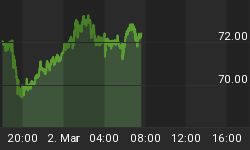Despite all the supposedly good news emanating from the US in the form of "improving employment conditions" allow me to be the one who continues to shout FIRE or more accurately "Finance, Insurance & Real Estate". What do I mean by this?
- Are pension funds solvent?
- Are the finance and insurance sectors recapitalized?
- Have real estate losses been recognized and fully liquidated?
- Are governments repaying or even capable of repaying their debts?
- Have trillions in unfunded social liabilities disappeared?
In short, have any of the problems created by the FIRE economy been fixed? No.
In fact, rather than address the mal-investments that are at the heart of the ongoing financial crisis, our central banks and governments have only temporarily delayed their liquidation via the expedients of massive fiscal deficits and money printing (see table below) - though just how far into the future remains to be seen.
Money Well Spent?
Just how much longer can the Federal Reserve keep expanding its balance sheet (aka printing money) at this pace?
And it is not just the Federal Reserve - all major centrals banks have been rapidly expanding their balance sheets - in both relative...
and absolute terms...
Bubble Heading for a Pin?
Apologies for the continued skepticism of the sustainability of Canadian residential real estate prices, but doesn't this market seem passingly similar to the US in 2007 right down to low affordability, a government sponsored entity (CHMC) overtly subsidizing risk for commercial lenders and a central bank keeping interest rates artificially low?
Some Quotable Quotes
The always entertaining if not particularly prescient Ben Bernanke, Chairman of the Federal Reserve:
"We've never had a decline in house prices on a nationwide basis. So, what I think what is more likely is that house prices will slow, maybe stabilize, might slow consumption spending a bit. I don't think it's gonna drive the economy too far from its full employment path, though." - July 1, 2005
"Housing markets are cooling a bit. Our expectation is that the decline in activity or the slowing in activity will be moderate, that house prices will probably continue to rise." - February 15, 2006
"At this juncture . . . the impact on the broader economy and financial markets of the problems in the subprime markets seems likely to be contained," March 28, 2007
"While rising delinquencies and foreclosures will continue to weigh heavily on the housing market this year, it will not cripple the U.S." - May 17, 2007
(the subprime fallout) "will not affect the economy overall." June 20, 2007
"It is not the responsibility of the Federal Reserve - nor would it be appropriate - to protect lenders and investors from the consequences of their financial decisions." October 15, 2007
"I expect there will be some failures. I don't anticipate any serious problems of that sort among the large internationally active banks that make up a very substantial part of our banking system." February 29, 2008
"Despite a recent spike in the nation's unemployment rate, the danger that the economy has fallen into a "substantial downturn" appears to have waned," June 9, 2008
(Freddie Mac and Fannie Mae) "...will make it through the storm", "... in no danger of failing.","...adequately capitalized" July 16, 2008
"most severe financial crisis" in the post-World War II era. Investment banks are seeing "tremendous runs on their cash," Bernanke said. "Without action, they will fail soon." September 19, 2008
2011 - Bernanke's response when asked how confident he was that he could control inflation - "One hundred percent"
Or if you prefer just to listen - here is a compilation of quotes direct from the source:
Regards,
Agcapita Farmland Fund III
Agcapita Fund III is currently open and RRSP eligible.
- Residents in BC, Alberta, Saskatchewan or Manitoba - CLICK HERE to be contacted with more info.
- Resident in Ontario and an Accredited Investor - CLICK HERE to be contacted with more info. The Ontario Securities Commission has a detailed definition of Accredited Investor which can be found HERE.
















